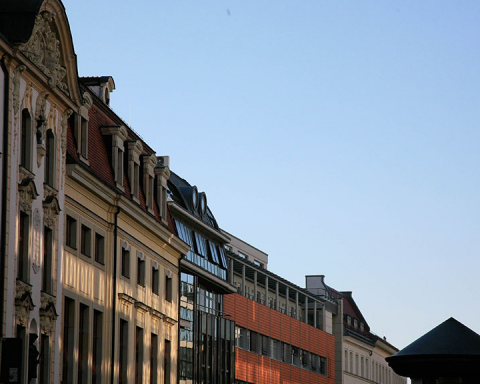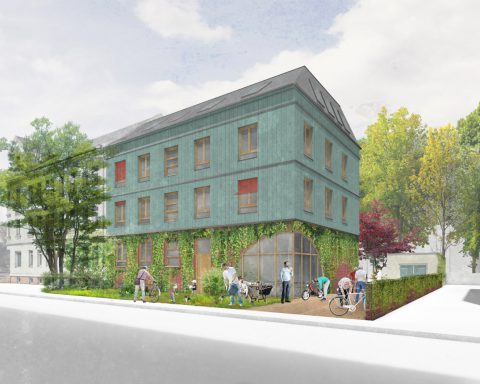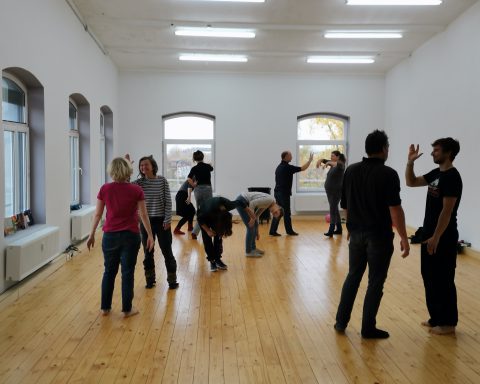What if you lost everything – would you still know how to live within your own four walls?
This article is a mix of review of a symposium I attended earlier this month and everything I have been feeling/thinking since discussions on refugees began to heat up last year; hence it is not an academic review. And yes, I do feel entitled to speak and criticize the course we took in dealing with the so-called ‘refugee-crisis’. Though I’m not German, I am a political subject living in Germany. And when I say ‘we’, I’m talking about Germany in an inclusive and not nationalistic way – as an aggregate, or rather, a community of different people facing the challenges of inclusion, which are mostly to be solved within national borders.
Sharing space with the ‘other’
Whenever we talk about refugees, we tend to have this very impersonal picture of a herd of people. They are numbers, statistics, and demographics. They are a logistical problem of the first degree. The discussions, which in the beginning were led by questions about how to welcome, accommodate and help these people, shifted gradually – yet not completely – to another direction. Now it seems more important to discuss how to avoid them coming/how to keep them away, how to get rid of them faster, how to teach them ‘German values’.
This shift doesn’t have much to do with Cologne, as common sense suggests. Cologne being a watershed in public discourses is nothing that happened suddenly. It simply became a symbol that represents the culmination of other discourses, which were gaining more and more prominence last year. And these discourses have been latent in society and already disguised in policies. Nobody needed a crystal ball to see that the materialization of the challenges, namely having to share resources and space (public spaces, neighborhoods, schools etc.), would become a problem for many. This is the level at which the refugees suddenly acquire faces.
Like a mental slideshow, we see faces of mostly ‘non-blond’ people (yes, this is still the German self-perception) – men, women, and children – with suffered semblance and apprehensive glance. When they come, we see them as having no personal history, no network of friends, no past behind the war. In this mental slideshow, we might also have pictures of the war itself, of terrorism, of ISIS propaganda, and also a very subjective and biased picture of the Muslim-other, who has already been our neighbor for years. And we are confronted with the question: ‘do I want to share anything with these people?’ Many of us would simply say: ‘yes’. Many of us would say: ‘only under conditions’ or ‘just a few things’. Many of us would basically say ‘no’.
Recognizing humanity in the ‘other’ is maybe the first step to feeling compassion and showing solidarity. Because we barely know the personal stories of the refugees, we tend to not see them as peers. But there is also another issue, one that is hard to speak about and acknowledge – behind our ‘worries’ is also racism, classism and other expressions of prejudice. And this is not exclusive to ‘concerned citizens’, though they articulate it louder. This is something politicians and their policies (and other actors, like the media) are teaching us.
Learning how to live: a symposium
The long introduction serves as context for my review of the recent symposium LEARNING HOW TO LIVE? THE PRACTICE OF HOUSING REFUGEES AND OPTIONS FOR SELF-DETERMINED LIVING – organized by the Initativkreis: Menschen.Würdig. and the Kulturbüro Sachsen in Leipzig. The bottom line is that housing policies for refugees in Germany, and more specifically in some Bundesländern (the national guidelines are very general and the federal states and cities can come up with their own regulations), reflect those expressions of prejudice. This is one point that became very clear to me in this symposium.
Bernd Mesovic (Pro Asyl) opened the symposium and made the situation very clear in a brief statement. Under the flag of organizing the arrivals, enabling first aid and social work, and introducing integration, refugees undergo a systematic disempowerment, where basic human rights are suspended. Through the current housing practices, they are not able to find any normality in life; they lose any private or intimate sphere, together with the right to adequate housing – not to mention that they have their freedom of movement restricted.
For those who don’t know, the right to adequate housing is a freestanding human right (secured through international conventions and the German constitution). Therefore, it does not need to be earned. But the housing practices for refugees point to another direction and lead to stress, suffering and resentment. According to Kay Wendel (Brandenburgischer Flüchtlingsrat), since the accommodation calamity (Unterkunftsnotstand), the practices of housing for refugees have became a ladder in which logistical issues are mixed with politics/strategies of deterrence and inhibition and there is almost no room for self-determination.
While we might think that it is a transitional phase and that anything is better than war, refugees probably think the same in the beginning. However, months or even years might pass before they can see any significant improvement in their lives through a very unclear bureaucratic navigation, their complaints mostly being perceived as ingratitude and inability/reluctance to integrate.
After leaving the first mass shelters, where they arrive, and being distributed to the big shelters in the cities, the next step is most probably the ‘Gemeinschaftsunterkünfte’ (a better word for ‘Lager’). It is not uncommon for these to be placed in almost isolated areas or drab suburban areas. Inside, a very German word – ‘Hausordnung’ – sets the tone of how people live and relate. The ‘Hausordung’ is not a democratic document, but normally a repressive and often unlawful set of rules issued only by the landlords. Refugees and activists complain about precarious conditions and abuse, especially from the side of private security guards. They are often not allowed to have visitors (not even German volunteers), and are submitted to attendance checks and room searches. Humiliation and even violence are not isolated cases. And still, these Gemeinschaftsunterkünfte have become a profitable business model.
It is important to say that many states and cities are much further along in the process of housing asylum-seekers in private flats. However, the broad guidelines on the national level allow for huge discrepancies between cities and the federal states. It was already an issue before the culmination of the crises last year. Now it is worse.
Whereas isolation and abuse are not the keywords for inclusion, the principle of ‘housing first’ appears to be a fairer, more effective and less expensive alternative. ‘Housing first’ is about guaranteeing people their housing rights in the first place, or in other words, their own decentralized flats. It is not a luxury as many might think. Sam Tsemberis (Columbia University) says it is a concrete slogan for something bigger, namely: putting people first. More than that, it is a right. And, indeed, it doesn’t have the functions of deterrence and inhibition. The social service and even counter performances like going to integration and language courses occur parallel and independently. Many experiments in the U.S. and Canada (check the NGO PathWays to Housing) as well as in Germany (check the Leverkusen-Modell) have successively shown that in addition to being less cost intensive, it impacts society more positively and reintegrates people more rapidly into the social realm.
Some could argue that this decentralized solution is impossible due to the emergency of the situation and to the actual deficit of housing in many German cities. While this might be true, cities are spending money building new massive centers, which are not meant to last just a few months. Henrik Lebuhn (Humbolt-Universität) and Jan Kuhnert (KUB Kommunal- und Unternehmensberatung) reason that it is in the interest of every citizen that these investments flow to social sustainable and long lasting solutions, preventing the creation of ghettos and of the social problems which are typical of them. In addition, both specialists stress that the ‘Unterbringugskrise’ (accommodation crisis) is not only a result of the big flows of refugees towards Germany but, above all, an outcome of years of budget cuts in key social areas and public services, e. g. the privatization of social housing and degradation of the school system.
Lebuhn denounces the Gemeinschaftsunterkünfte as facilities with totalitarian traits. He uses the concept of the ‘neo-liberal shock therapy’ of Naomi Klein, to say that this crisis has been instrumentalized as a means to create a substandard for all citizens. In other words, he argues that some measures and regulations that otherwise would not be acceptable (in this case: the redefinition of minimum standards of housing and other welfare cutbacks), get pushed through because of their emergency status. However, they negatively impact the whole society in the long term.
Jan Kuhnert pleads for a social/solidary development of cities. This would mean that there should be no ‘not in my neighborhood’, as well as no overloading of a few neighborhoods in order to please more affluent citizens. However, avoiding the formation of ghettos does not mean that participation in concepts and finding solutions is not requested – it should be fostered. A more social and long-lasting strategy for the development of cities would help all of society counter one of the main problems in big German urban centers nowadays: the lack of affordable housing.
Accommodation in the Gemeinschaftsunterküfte leads to another problem: who is eligible to move into his/her/their own flat? When? How does one set the priority groups among asylum-seekers? Whereas some very objective criteria are incontestable – e.g. families with children, people needing special care because of disabilities or diseases, or even threatened persons – other criteria are just discriminatory.
In Potsdam for example, when the city decided to shorten the residence time in the Gemeinschaftsunterküfte (from 3-5 years to 6-12 months), a ‘residential ability test’ (Wohnfähigkeitsprüfung) was used to check the eligibility/housing readiness. Similar tests are used also in other cities. However, this concept, by itself, is questionable. The assumption asylum seekers (a very heterogeneous group) are not able per se to have their own homes, live in a community and adjust to a new social environment is biased, if not dangerous. Alexander Klose (jurist of the Humbolt-Universität) conducted a study with Doris Liebscher (on behalf of the Anti-Discrimination Council from Brandenburg) about the compatibility of this test with the German Constitution, the Anti-Discrimination Law of the European Union as well as with international law agreements. The questionnaire used to evaluate the ‘housing readiness’ was considered to be discriminatory, and one of the crucial factors for this judgment was the use of German language knowledge as a disqualification point.
One contribution of this morning left people uncomfortable in their seats. The talk of Napuli Paul, an activist of the Oranienplatz Resistance, was on the one hand, less objective about giving solutions, scrutinizing housing practices or even life in the ‘Gemeinschaftsunterkünfte’. On the other hand, she came with an anti-imperial discourse (something that is for most people in the north, especially Germans, hard to swallow) and with one bold statement: “I am also a human being. (…) Why are Germans doing this to me?”











